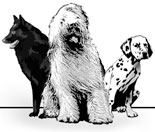Q: Is my dog dominant?
A: The concepts of “dominance” and “alpha” were originally incorrectly applied to dogs. These concepts came about as the result of studies on captive wolves. While dogs have descended from wolves, they are NOT wolves. They are domesticated dogs. I prefer to use the concept of “benevolent leader”; this indicates that you have the big brain and opposable thumbs, and can provide all the good things for your dog that he wants! This is a major bargaining point for you, as your dog’s leader, and eliminates the use of force.
Q: My puppy is 11 months. Can I enroll him in a Puppy Class?
A: Unfortunately not. The Puppy Manners class is intended for puppies aged 16 weeks or younger at the start date of the class. This is because the “socialization period” for puppies begins to end at about 16 weeks of age. Socialization is the process by which dogs must be exposed to everything they need to experience in order to live a well-adjusted life. Much of the focus on the Puppy Manners class is socialization. If your puppy is older than 4 months, he or she will have already passed that developmental stage, and hopefully you have helped your dog to learn about all the neat and wonderful things in the world by then anyway. I sometimes make exceptions for tiny puppies who are older than 4 months but less than a year.
Q: Why is food-based training better than using a choke chain?
A: Using a choke chain can have results, for sure, but when you use a reward-based system for training, you are building a “working relationship” with your dog. You either lure your dog or wait for him to naturally do something (i.e., look at you) and then reward him with something good, like food. In this manner, it becomes his idea to do cool stuff with you and for you, he gets great prizes for it, and it makes the whole ‘training’ thing much more fun. This involves active thinking on the part of the dog, as opposed to the rather passive style of learning which takes place when your dog is ‘corrected’ or put into a position. In addition, there is no discomfort or pain involved in food-based training, so the dog is (and you are) more relaxed. Little learning can happen when a dog or person is stressed.
Q: When should I start to train my dog?
A: The best answer I can give you is, as soon as possible!! If you are planning on getting a puppy, you should look for and enroll in a puppy class as soon as possible! I normally want to have a puppy have two sets of vaccines (mostly we are concerned with Distemper and Parvovirus) but for some breeds, I’d rather have the puppy in a class, observing, even if they don’t play for the first week or two. Socialization is so critical at these early weeks because we can’t delay the timing of it; we can’t say, “Oh, we’ll socialize him when he’s older”. It doesn’t work that way; use it or lose it. And it’s lost at around 4 months of age.
Alternatively, if you bring home an older pup or dog, there is little or no reason to wait for that dog to get used to being around you before bringing him for training. The purpose of training is to build a working relationship with your dog, so training helps the process; it doesn’t hinder it!
Q: If I start clicker training, do I have to click and treat my dog forever?
A: NO! Just like when you use a choke chain or any other tool, it’s just that…a tool. Once the skill(s) is learned, you will need to fade the tool out of the picture. This means to make it less obvious, and to use more natural rewards. Using food is a “primary reinforcer”; it’s something that is required for survival. We pair primary reinforcers with “secondary reinforcers”, or those which are not necessary for survival, but through association with primary reinforcers, they become important to the dog. Examples of secondary reinforcers are praise, smiling, petting, playing with toys, or running around. Many people don’t like the concept of using food-based or clicker training because they feel that they will always have to use food to get the dog to do what they want it to do. If this is the case, then training isn’t complete. Often, it’s best to work with an experienced trainer to learn how to do this.
Q: I don’t want to use food to train my dog. It’s bribery!
A: Well, that’s not really a question, but it deserves a response!! Using food as a reward is nothing close to bribery…you ask the dog to do something, and if he does it, he is rewarded for it. Of course, it’s more complicated than that, but the differentiation that needs to be made here is that I’m not offering the dog something, and saying, “If you do this, then you get this treat”. That would be bribery! Having said that, it is important to understand that since we don’t physically manipulate or force our dogs to do things, we need to have a way to show them what we want them to do. Using food as a motivator to lure the dog into a down position is teaching, not bribing. Once the dog has learned the hand signal in association with the body posture and the verbal cue, we can truly begin to use food as a reward for a correct behavioral response. If we didn’t do that, then we would be bribing our dogs!
Q: I think my puppy is aggressive. He’s biting my ankles and hands. Should I be worried?
A: Probably not. It’s likely that your puppy is simply being a puppy and doing a puppy thing. While I need to take each case into consideration individually, these behaviors are examples of what puppies do naturally; they explore their world with their mouths (they don’t have opposable thumbs, remember?). Often, puppies are taken away from their littermates way too early. When this happens, they lose the opportunity to complete their learning of bite inhibition, or, “how hard can I bite this pup/person before it hurts and they won’t want to play with me anymore?” We manage these behaviors, teach appropriate alternate behaviors, and make sure that they get into a puppy class so they can continue to interact with other puppies and complete that learning!
Q: My dog isn’t a puppy anymore. He’s having accidents in the house. I know he knows better because when I scold him he cringes and runs away, but he just won’t stop it! What do I do?
A: Actually, he doesn’t know better. Your dog is not housetrained. He has not fully learned the rules of where to eliminate. Remember that housetraining follows human rules, and our dogs are not human. Dogs follow canine rules, which state that you eliminate away from the center of normal activity. If your dog is eliminating in the basement, guest room, formal living room or formal dining room, or a little-used room in your home, your dog is following canine rules. It is now time for you to set up a strict program to manage where he goes and what he does, to prevent him from making mistakes, show him where you want him to go, and reward him for eliminating in the right place. A good trainer can help you to create a program to achieve this goal. It will take weeks, maybe months, but it’s worth it!
Q: How long do I have to train my dog before he listens to me?
A: Forever!! Any time you and your dog are together, one of you is training the other! More seriously, plan on taking your puppy to classes fairly regularly until he’s at least one year of age. For my classes, this might be Puppy Manners, then Foundations, then Beyond the Basics or CGC (Canine Good Citizen). By then, you and your dog will have learned quite a bit about each other, and while your dog may not be perfect, your relationship will be great, and you both will have learned how to learn. If you start with an older dog, a year is still a good time period for which to plan.
Top of Page
F A Q s



